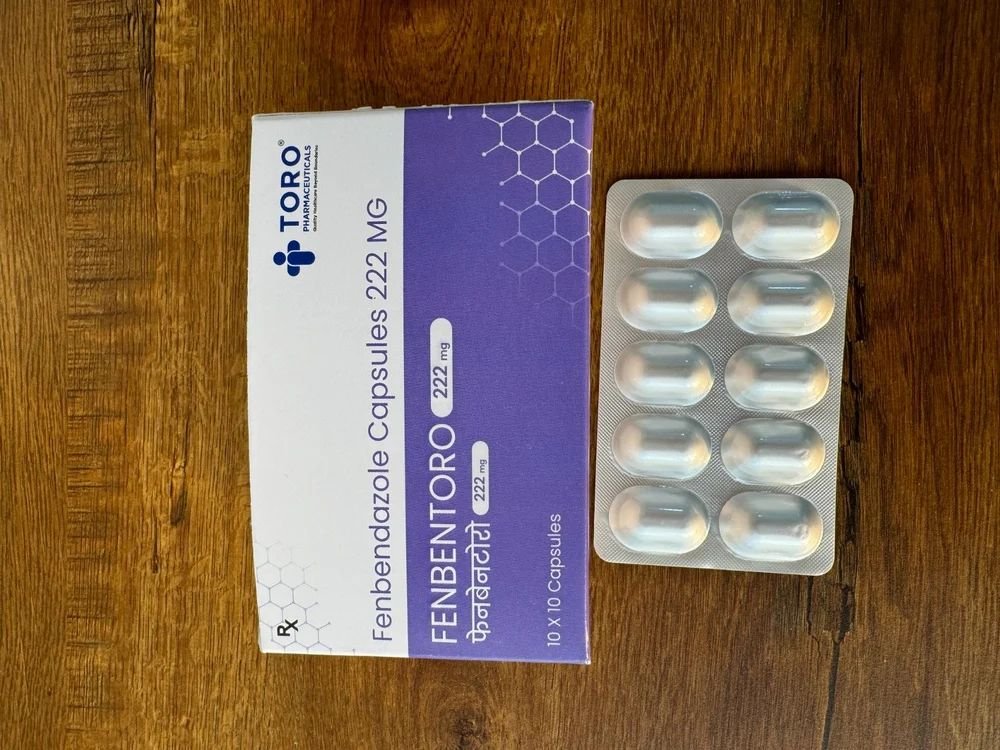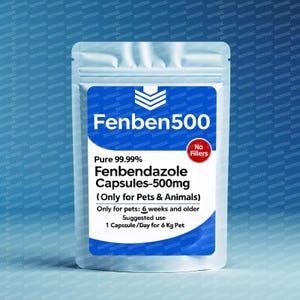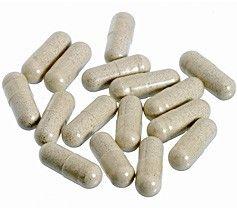All You Required to Understand About Fenbendazole and Its Makes Use Of in Family Pet Care Solutions
Fenbendazole is a commonly recognized anthelmintic drug in vet care. It effectively targets different stomach parasites in pets. Understanding its device and proper applications is essential for pet owners. This medicine provides noteworthy advantages however also needs careful dose and monitoring. As family pet treatment advances, exploring fenbendazole's role can give insights right into maintaining optimal health for cherished pets. What should family pet proprietors understand about its management and security?
What Is Fenbendazole?
Fenbendazole is an anthelmintic medication largely utilized to treat parasitical infections in animals. This broad-spectrum dewormer works versus a selection of intestinal parasites, including roundworms, hookworms, whipworms, and specific sorts of tapeworms. It is generally used in canines, felines, equines, and animals, making it a versatile choice for pet proprietors and veterinarians alike. Fenbendazole is generally carried out by mouth, offered in various solutions such as granules, tablets, or suspensions. The drug is usually taken into consideration risk-free, with a low incidence of negative effects, although it is crucial for family pet proprietors to adhere to dose instructions thoroughly. By getting rid of parasitic infections, fenbendazole aids maintain total health and wellness and well-being in pet dogs, ensuring they remain active and lively. Its efficacy and safety and security profile have added to its prevalent use in vet practice, developing fenbendazole as a keystone in animal treatment services.

Just How Does Fenbendazole Work?
Targeting bloodsuckers at a cellular level, fenbendazole interrupts their metabolic processes. This anthelmintic medication largely inhibits the feature of microtubules, crucial parts of the parasite's mobile framework. By binding to tubulin, a protein that creates microtubules, fenbendazole stops the assembly of these frameworks, which are necessary for numerous mobile functions, consisting of transportation and division. As an outcome, the impacted bloodsuckers are not able to maintain their life cycle, leading to their ultimate fatality.
Fenbendazole also disrupts energy production in bloodsuckers by hindering the enzyme fumarate reductase, essential for their metabolic rate. This dual activity not just hampers their ability to duplicate but additionally compromises their energy supply, more boosting its efficiency. Generally, fenbendazole's targeted system enables effective control of a wide spectrum of parasitic infections, making it a beneficial device in vet medication for the treatment of infested animals.
Typical Uses of Fenbendazole in Animal Treatment
In the domain name of vet medication, fenbendazole is commonly utilized for its efficiency versus a variety of parasitic infections in pets. This broad-spectrum anthelmintic is primarily used to treat gastrointestinal parasites such as roundworms, hookworms, whipworms, and tapeworms. Fenbendazole is likewise efficient against particular protozoan infections, consisting of giardiasis.
Vets commonly prescribe fenbendazole for regular deworming in young puppies and kittycats, given their vulnerability to these parasites. Furthermore, it is used in adult canines and felines as part of a thorough bloodsucker control program.
Fenbendazole is preferred for its security account, making it ideal for use in different breeds and ages of animals. It is typically provided in dental form, via granules or tablet computers, allowing for very easy unification right into a family pet's diet regimen. Routine usage of fenbendazole adds to keeping general health and wellness in pets by protecting against and taking care of parasitic infections successfully.
Benefits of Fenbendazole for Pets
Fenbendazole uses considerable benefits for animals, specifically as an effective therapy for numerous parasitical infections. Its safety and security account makes it suitable for a range of animals, ensuring that both pets and felines can benefit from its usage without considerable threat. This mix of efficiency and security placements fenbendazole as a valuable option in pet dog treatment.
Reliable Parasite Treatment
Various pet proprietors look for effective services for parasite problems, and fenbendazole has arised as a trustworthy option. This broad-spectrum anthelmintic medicine targets various internal parasites, including roundworms, hookworms, and whipworms. Fenbendazole disrupts the power metabolic rate of these bloodsuckers, bring about their elimination from the pet dog's system. Its efficiency is significant throughout various varieties, making it a versatile selection for numerous pet owners - fenbendazole capsules. Furthermore, fenbendazole is often well-tolerated, with marginal side results reported, which enhances its appeal as a therapy option. Regular use of fenbendazole can aid preserve an animal's health and wellness and convenience by preventing the complications connected with parasitical infections. On the whole, fenbendazole attracts attention as a beneficial tool in the fight against usual bloodsuckers in pet dogs
Safe for Different Animals

Dose and Management Standards
When thinking about fenbendazole for animals, recognizing the appropriate dose is necessary for efficiency and safety. Suggested dosage guidelines vary based on the type of animal and the particular condition being treated. Additionally, different administration approaches can influence the overall success of the treatment.
Advised Dosage Standards
Although fenbendazole is a commonly made use of anthelmintic in vet medicine, establishing the proper dose for pets is vital to ensure both effectiveness and safety. The advised dosage generally varies based upon the type of bloodsucker being treated and the pet's weight. For pets and cats, an usual standard suggests administering 50 mg per kilo of body weight daily for 3 consecutive days. In some instances, a veterinarian might suggest a much longer therapy duration or change the dose based on private health conditions. It is vital for family pet proprietors to consult a vet prior to providing fenbendazole, as improper dosages might result in inadequate therapy or possible adverse effects, stressing the importance of specialist advice in pet dog care


Management Methods Clarified
Administering fenbendazole to pet dogs requires cautious factor to consider of the method to assure suitable absorption and performance. One of the most typical administration techniques consist of oral formulations, such as tablet computers or suspensions. Tablet computers ought to be given entire, while suspensions must be shaken well prior to usage. For pets that are tough to medicate, mixing fenbendazole with a percentage of food can boost approval. Application typically relies on the animal's weight and the details problem being dealt with. It is essential to follow veterinarian suggestions carefully and finish the complete program of therapy, also if symptoms enhance. Checking for negative effects is also crucial, as damaging responses can occur, albeit infrequently. Correct administration assures the medication's efficiency and the animal's health.
Safety And Security Considerations and Potential Negative Effects
While fenbendazole is commonly identified for its performance in treating various parasitical infections in family pets, it is important to review the safety and security account and possible side results linked with its usage. Typically, fenbendazole is thought about secure when provided at advised does, but some animals may experience damaging reactions. Usual adverse effects include gastrointestinal disruptions such as throwing up and looseness of the bowels, as well as sleepiness or anorexia nervosa.
In uncommon cases, allergies may occur, leading to signs like swelling or problem breathing (fenbendazole 444). It is vital for pet dog owners to monitor their pets carefully during treatment and report any type of unusual behaviors to a vet. In addition, fenbendazole should not be used in pet dogs with recognized hypersensitivity to the drug or in pregnant pets unless especially suggested by a vet. Overall, informed usage and veterinary guidance can assist reduce risks connected with fenbendazole therapy in family pets
Frequently Asked Concerns
Is Fenbendazole Safe for Pregnant Animals?
The safety and security of fenbendazole for expecting family pets remains unclear. Some studies recommend possible threats, while others show it may be risk-free. Consultation with a vet is important to guarantee the health and wellness of both the mother and her children.
Can Fenbendazole Be Made Use Of for Pet cats?
Fenbendazole can be utilized for cats, primarily to treat certain sorts of parasitical infections. It is crucial for family pet proprietors to consult a vet for ideal dose and safety standards specific to their cat's wellness.
Exactly How Lengthy Does Fenbendazole Require To Work?
The time it takes look at more info for fenbendazole to work normally varies from a few days to a week, relying on the specific problem being treated and the specific blog animal's reaction to the drug. Constant dosing is necessary.
Are There Any Interactions With Other Medicines?
Potential interactions with other drugs ought to be thoroughly taken into consideration when administering fenbendazole. Consulting a veterinarian is vital to ensure risk-free mixes, as specific medicines may alter its efficacy or increase the risk of adverse effects in pets.
Where Can I Acquisition Fenbendazole for Pet Dogs?
Fenbendazole for family pets can be acquired at veterinary clinics, pet supply shops, and online retailers. It is important to assure the product is especially formulated for animals to confirm safety and security and performance in therapy.